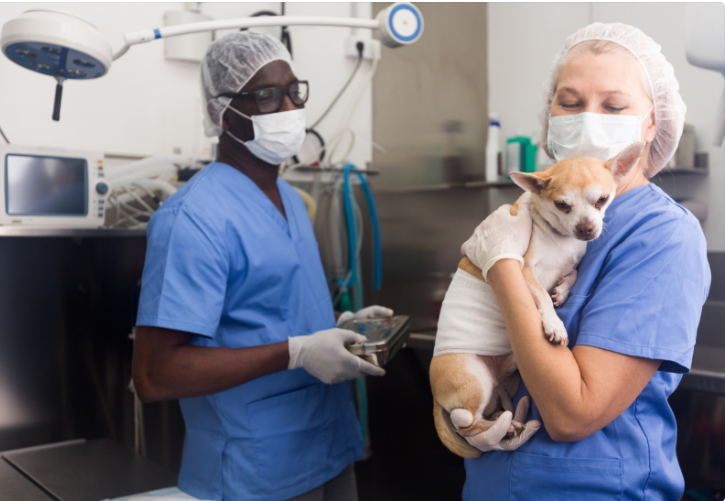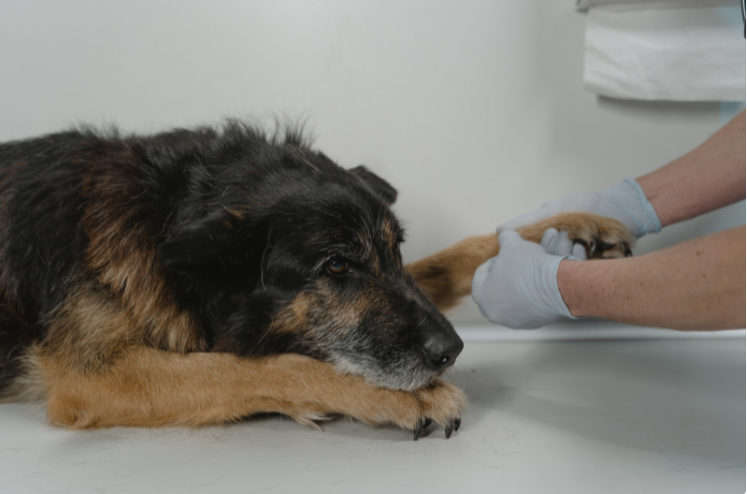

Most of us grew up hearing that as long as our pet had a wet nose, he or she was in good nick. There are many health signs that pet parents need to be aware of.
Our six pet emergencies that can’t be ignored will help you decide whether to rush to the vet immediately or if it’s okay to leave something until the next day.
Suddenly Swollen Abdomen
The most severe cause of a swollen abdomen is gastric torsion (also known as GDV or “bloat”), where the stomach twists, closing off the entrance or exit. The contents ferment, and gas and fluid quickly build up, stretching the stomach to a dangerous size, affecting breathing and blood circulation. This is one of the most common causes of death in dogs, second only to cancer. Most at risk are large breeds and those with deep chests. If your dog’s chest and tummy are very tight to the touch and he is trying to vomit, if he’s pacing and whining and looks weak, GET TO THE VET IMMEDIATELY. This is ‘red lights and sirens’ stuff, as time is crucial!
Bloat can be prevented by feeding smaller portions of food instead of one big meal and ensuring that he doesn’t drink lots of water or race around before or after eating.
Eyes
Many things may cause injury to dogs’ and cats’ eyes, from running into twigs to rough and tumble with other pets. Any damage to the structure of the eye, be it a scratch or a visible ulcerated area on the cornea, needs to be seen by a vet immediately. These are extremely painful, and the pet will usually keep his eye closed. Infections are also very sore, and pets can cause more trauma to the eye area by rubbing or scratching. NEVER be tempted to use eye drops prescribed previously for any eye condition, no matter how similar the symptoms. Using the incorrect medication for a condition may do more harm than good. The worst eye injury, and one that requires emergency attention, is where the eyeball pops out of its socket after a blow to the head.
Not Passing Urine
Blood in the urine or reddish-brown urine may be symptoms of various problems, including biliary, prostatitis or a bladder infection.
Straining to urinate is particularly serious and needs to be treated as a life-threatening emergency in male dogs and cats.
Trauma, Bites and Bleeding


If your pet ever experiences blunt trauma, e.g. falling from a height, being bumped by a vehicle or accidentally whacked with a cricket bat, visit the vet immediately for a check-up.
Any bleeding that doesn’t stop within 5 minutes of careful pressure applied to the wound should be seen by a vet. Puncture wounds are often dismissed as less serious than wounds that spurt fountains of blood. However, the damage done by teeth, powerful jaws, or a foreign object is invisible from the outside and often life-threatening. Deep puncture wounds introduce bacteria and may affect muscles and organs. They need prompt expert evaluation, pain management, cleaning and antibiotics to prevent abscesses and tissue death.
Bleeding from the nose, ears or rectum should be treated as an emergency too.
Coughing/Difficulty Breathing
This may be due to your pet choking on something, exercising to a level that is too taxing for his weight or age, a throat infection or even an underlying heart condition. If you have a brachycephalic breed like a Bulldog, Pug or Peke, or a Persian cat, be extra wary about breathing difficulties. Anything outside of normal snorting and snuffling should be treated as serious and warrants a vet visit.
No dogs should be exercised strenuously in the heat of the day, as heatstroke is a very real danger. If your dog is panting excessively with a purple tinge to the tongue and gums after exercise or on a very hot day, has a racing heart rate, a high temperature (above 40 degrees C) and is distressed, hose him down immediately and cover him with cold, wet towels. Have a fan or air-conditioning unit blow over his body and get him to the vet at top speed.
Not Eating or Drinking
No dog or cat will voluntarily go on a hunger strike – there is always a good reason for inappetence. Even picky eaters seldom miss meals or snacks all day without sampling a little of what’s on offer. Some pets regularly miss a meal or two, but if they behave normally and aren’t losing weight as a result, it may not be cause to worry. If disinterest in food is accompanied by other symptoms like lethargy, vomiting, diarrhoea (especially if both occur together), pain or other unusual behaviour, off to the vet!
Keeping our furry family members safe from every danger is impossible. But knowing what emergency signs and symptoms to look out for, having a great pet medical savings plan in place to give you options in the event of unforeseen veterinary expenses, and keeping your home Pet First Aid Kit well-stocked for those day-to-day mini-dramas, will give set your mind at ease and allow you to enjoy the many non-stress-inducing aspects of being a pet-parent.
Feel free to contact CVC with any questions or concerns – our dedicated staff are always happy to help!
